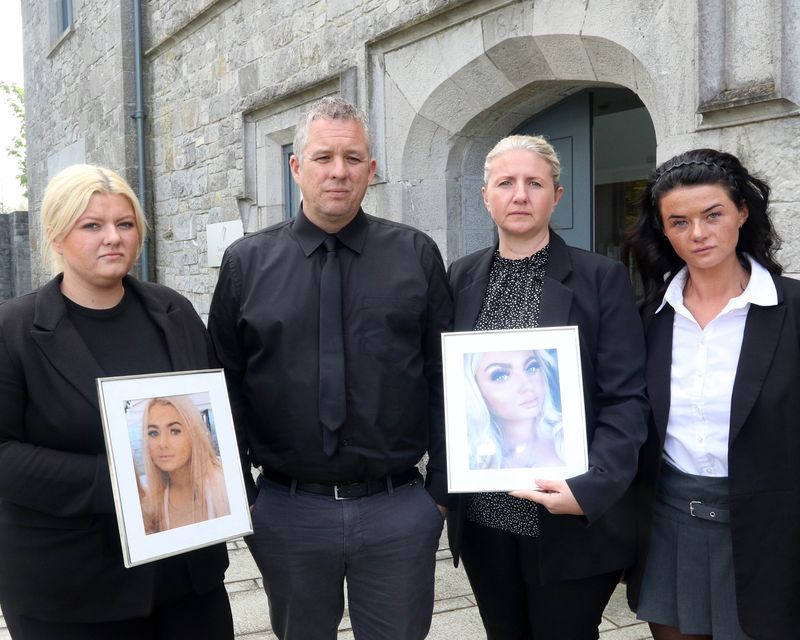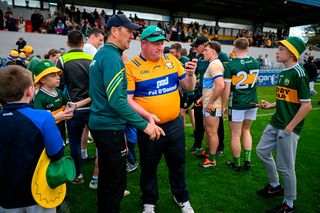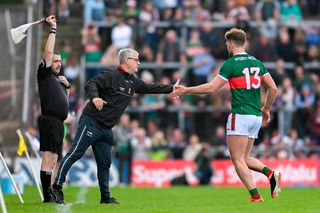‘I never got to say goodbye’ – Aoife Johnston’s big sister weeps as coroner rules teen died by medical misadventure at UHL
Co Clare teenager died of sepsis after 15-hour delay in treating her with antibiotics
'I never got to say goodbye': Aoife Johnston's sister Meagan speaks outside court after the teenager's inquest.
The older sister of Clare teen Aoife Johnston (16) wept this afternoon as she spoke of her devastation at not being able to say a final goodbye to her baby sister.
Meagan Johnston spoke as Limerick Coroner John McNamara returned a verdict of death by medical misadventure for Aoife who died at University Hospital Limerick's emergency department after waiting over 15 hours for the antibiotics that would have saved her life just days before Christmas in 2022.
Aoife's parents, James and Carol, and her sisters, Meagan and Kate, wept as they spoke of the nightmare they have endured since the teen's death on December 19, 2022.
The family spoke outside Kilmallock Courthouse after the emotion-charged four-day Limerick Coroner's inquest into the circumstances of Aoife's death.
The Johnston family admitted they were shocked to hear UHL's emergency department described as "a death-trap" by Emergency Consultant Dr James Gray the weekend that Aoife sought life-saving treatment.
"It is terrifying [to hear that]. I would be terrified myself,” Carol said.
"We brought Aoife where we told her she would be looked after but she was not. We told her she was in the best place. We told her to get some rest and that the doctors would be here soon. But the doctors never came."
Meagan said the loss of Aoife was "devastating”.
"I will never forget Aoife - she was just the best sister ever. It kills me all the time that I never got to say goodbye to her. When I got back [to UHL] Aoife was already gone - I will never forget that drive into the Intensive Care Unit,” she said.
"I immediately made my boyfriend drive me there to see my sister. I never got to say goodbye to my little sister. I never go to say goodbye to her - she was gone.
"I never got to see my sister complete her Leaving Cert, I never got to see her do her graduation, I never saw my sister moving onto the next chapter with her boyfriend. He is left heartbroken."
Meagan said when she was told Aoife was in hospital she thought she would be OK.
“But then the next morning… to get the call that she was in ICU. I didn't know what to do?" she said.
"That's my baby sister and we never get to see her again. I am so grateful [for] this beautiful girl. She was such a beautiful girl inside and out.
"She was an amazing person and I will cherish the memories of her forever and ever. I am so sorry Aoife for what happened to you. But my Mum and Dad did everything they possibly could for her."
From left, Aoife's sister Kate, parents James and Carol and Aoife's other sister Meagan outside the coroner's court. Photo: Brendan Gleeson
Aoife’s other sister Kate said she wanted everyone to know the person Aoife was.
"She was such a nice and kind person," she said through her tears this afternoon.
Aoife's parents, James and Carol, demanded action to tackle the overcrowding crisis at UHL and warned they don't want any other family to endure the nightmare they have suffered.
"Aoife at the minute is remembered as being the girl that died on a trolley," Carol said.
"That is how Aoife is known. In time, when me and James can talk to people properly, they will get to know the real Aoife and the lovely 16-year-old girl she was. She was our baby who we loved very, very much.
"Her sisters loved her very, very much. She was a happy, easy-going girl - happy-go-lucky, went to school, got summer jobs and she was never any hassle to me or her Dad - she was a good kid.
"As James would say, a cool kid. Aoife came on holidays with us every year - she would say 'no, no' because she was too cool but she loved every minute of it.
"From our experience, this should not happen to another child."
"Aoife is gone now so all the apologies and everything that they put in place is… the rest of our lives, it is not going to change that.
"It breaks out hearts - it was a horrible death. She suffered the whole night."
On December 17, 2022, Aoife was placed in a wheelchair and put in what her family described as a storeroom by the emergency department.
There were no trolleys available so James and Carol pushed two chairs together to offer her a make-shift bed.
Aoife was in such agony that even other patients on trolleys pleaded with doctors and nurses to help the teen.
Despite having a GP letter advising suspected sepsis, Aoife was not assessed by a doctor for over 12 hours.
Carol said she welcomed the verdict from the coroner and his recommendations about UHL.
"We welcome the verdict and the apology but that is not going to change anything. Aoife is gone now. That is what we have to live with. I don't know what else to say."
James said they went to UHL desperately looking for help for Aoife but did not receive it in time.
Her parents stayed with her at UHL and pleaded in vain for Aoife to be seen earlier than she was.
"We went to the hospital to get help but we didn't receive it. That is it, really? It is clear as day what happened," James said.
Carol said she hoped that the promised investments and improvements at UHL are delivered as quickly as possible.
"I hope there are improvements. I can't say any more about that," she said.
James warned that the people of the Mid-West now needed action, not words, about healthcare improvements.
"Let's hope that is it not all talk. They need to get on with it and sort it out. No more people should die in that hospital. For 100pc they need to sort it out,” he said.
Earlier, coroner John McNamara returned the verdict of death by medical misadventure for Aoife, who waited for 15 hours before getting the antibiotics which would have saved her life.
The family of Aoife Johnston responds to inquest verdict
It came after a day in which hospital consultant Dr James Gray described the UHL emergency department conditions that weekend as “a death trap” – and warned it remains a “death trap” today given the overcrowding.
Aoife's parents, James and Carol, and sisters, Meagan and Kate, fought back tears as the verdict was returned by Mr McNamara, whose bench had framed photos of Aoife on either side at the request of the Johnston family.
The family had asked for a verdict of death by medical misadventure, with both the UHL and the HSE raising no objection.
Mr McNamara said Aoife's death was “truly tragic” – and cited overcrowding at UHL as an issue of major concern.
“I am concerned about the overcrowding as a native of Limerick. I accept that changes have been implemented. However, for the formality of the record, I want to endorse wholeheartedly the recommendations of the Hamilton Report (into UHL's emergency department),” he said.
He said the verdict of death by medical misadventure was the only one that could be recorded.
“There were systemic failures, there were missed opportunities and there were communication breakdowns throughout. Aoife should have been treated in a timely manner,” he said.
“Time was of the essence and there was a window to treat her and give her the vital antibiotics she needed until the following morning...it was too late.
“Having heard the evidence – very difficult and very emotive evidence – I know how difficult it was for (UHL) staff who were deeply upset and emotional. It has affected some staff who have resigned or left the UHLG.
“You (Johnston family) have been living a nightmare since Aoife's death and this week has been revisiting everything.
“This inquest might end the involvement of a lot of us in Aoife's case but I know you will be living with this for the rest of your lives. There are no words that can convey the scale of the tragedy you sustained.
“You bore witness (in UHL) as to everything that happened.”
The inquest issued recommendations including that all Hamilton Report measures on UHL's emergency department be adopted, all sepsis patients should have their chart specially noted for the infection, there should be a formal plan to deal with overcrowding and all emergency department escalation contacts be made by email and telephone with all to be properly followed up.
Solicitor for the Johnston family, Damien Tansey SC, said they had shown “great dignity and courage” in enduring every parent's worst nightmare.
He said Aoife had received treatment one would not expect in a third world country.
“They find the circumstances of what happened (in UHL) to be incomprehensible. It was an intolerable situation for both doctors and nurses – but it was a dangerous, dangerous situation for this dangerously ill girl,” Mr Tansey said.
“They (James and Carol) were roaring for help for Aoife. They were pleading for help. Aoife was screaming in pain. One doctor (Dr Leandri Card) was moved and took Aoife out of turn. She acted extremely competently in dealing with Aoife and treated her as if she had meningitis.”
An independent inquiry remains ongoing into the circumstances of Aoife's death as she went over 12 hours unseen by a doctor in the emergency department despite having a letter from a ShannonDoc GP saying that she potentially had sepsis.
The inquest was told by emergency consultant Dr James Gray – who declined to attend UHL on the evening of December 17, 2022 despite a request from a nurse manager concerned about a spiralling overcrowding crisis – that overcrowding had left the emergency department resembling “a death trap” that weekend.
Dr Gray said he was never directly consulted on or asked for advice about Aoife’s condition - but said that she was failed both by the emergency department and the healthcare system.
Aoife Johnston (16), who died at UHL in December 2022. Inset, a photo of the teenager as she lay on a makeshift bed made up from two chairs in UHL's overcrowded emergency department hours before she died.
“Aoife Johnston had no chance. That is the tragedy of this situation. Had she been seen when she should have been then she would have had a much better fighting chance,” Dr Gray said.
“It was a death trap for Aoife Johnston (because of overcrowding). It (ED) was grossly overcrowded – it was unable to function and if anything happened it happened very slowly.
“It was a dysfunctional environment. It was beyond an emergency – it was an abuse of human rights. I was physically unable to come every single time I was called about it being overcrowded. It was always overcrowded.
“You have good staff working in a very poor environment. Every conceivable space is full of patients. There was leadership but unfortunately leadership just couldn't cope with the situation.”
He said that Aoife got good care when a junior doctor (Dr Card) diagnosed that Aoife had sepsis “but it was far too late”.
Dr Gray said the only thing that could have helped the situation in the UHL emergency department that weekend was triggering the major emergency plan.
Only that would have “decompressed” the strain in the emergency department.
He said that UHL faced a chaotic situation that weekend, adding that: “UHL is consistently the worst in the country (for overcrowding).”
Dr Gray said that while UHL did get a new emergency department several years ago, it did not receive the supporting hospital bed capacity to avoid overcrowding.
“They would need 300 (extra hospital) beds, at least, on top of what we have at the moment. As long as they continue to have ‘boarders’ (trolley patients) and the emergency department remains overcrowded it will continue to remain dangerous.”
Dr Gray welcomed a new 96-bed unit which will be opened next year, but said it was only a step in the right direction. A second 96-bedroom block is planned for 2028.
“That is a long time (to wait). Unfortunately it remains dangerous despite these measures.”
The consultant said he would immediately have attended UHL had he known a 16-year-old girl was at the hospital in septic shock.
“I was not consulted to give advice or to attend Ms Johnston directly,” Dr Gray said.
“I had been in for the day - I was on for 48 hours. I had been fielding calls throughout the day from three local injury units. I got a call at 10.28pm from the senior clinical nurse. She articulated to me that the department was extremely busy. I asked had she (the nurse) escalated the matter (to allow surge measures to ease pressure on the department).”
The specific case of Aoife Johnston was not raised to him.
Dr Gray told Mr Tansey that he had been on duty all day and had to be on duty again from 8am the following day.
“I am not superman. It is impossible – it is busy every day. It (UHL) is still the busiest hospital in the State today. The problem here is that you had one consultant on for the entire weekend – it is not good enough. I do not make the rules. There needs to be a lot more consultants to provide that 24-hour cover.”
He said it was “completely unacceptable” to see Category Two patients waiting for up to 19 hours for vital treatment.
“Had I known there was a 16-year-old child who entered the emergency department in septic shock and who could not get into the resus room...the system failed her.
“The emergency department failed her. If I had known there was a patient like that there I would have come in. The problem is that I was not asked to come in about a specific case.”
Mr and Ms Johnston told the inquest they had to watch their daughter dying despite their pleas for her to be helped.
Aoife had been placed in what they described as a storeroom in the emergency department – and as there were no trolleys available they created a make-shift bed for her from two chairs.
Mr Johnston said he repeatedly begged staff on duty to help his daughter as her skin developed a blotchy-type rash and another mark developed near her eye.
She was getting violently sick and her vomit was green in colour.
“I was up and down to the nurses all night pleading with them to help my daughter,” James said.
“Aoife was screaming in agony with pain to her right leg and head. I heard people outside on the trolleys asking the nurses and doctors to help Aoife. At one point a man said: 'Is someone not going to go into that girl?’. I continually begged for help."
Ms Johnston said that at one point they were told Aoife would be treated as if she had meningitis. But they were then asked to help medical staff by holding her down for an intravenous treatment as Aoife's limbs were by now involuntarily jerking.
From left, Aoife's sister Kate, parents James and Carol and Aoife's other sister Meagan outside the coroner's court. Photo: Brendan Gleeson
Ms Johnston said some staff at UHL were “very mean” to Aoife because she could not stand up by herself for a test.
“At 6am my daughter was finally reviewed by a doctor. She was in agony with pain in her head, her right leg, she was vomiting and she had blotchiness on her skin,” she said.
“The doctor told us that she would treat Aoife as if she had meningitis. After the doctor left, Aoife started to deteriorate even more. James went to the nurses station for help.
“Aoife was taken to resuscitation. By this point, Aoife's limbs were moving involuntarily. I was asked to hold down my daughter's arms so they could administer treatment.
“We were subsequently advised that Aoife would be put into an induced coma as there was swelling on her brain and that the coma would allow her body to relax.
“Aoife was moved to ICU. Following a number of scans we were advised that there was nothing that could be done to save Aoife.”
The inquest heard that consultants will attend the UHL emergency department for major emergency cases but not for patient volume matters.
Just one senior house officer, Dr Leandri Card, was left dealing with over 160 patients on December 17/18 as a flood of patients attended the emergency department. But the two senior registrars, Dr Mohamed Hassan and Dr Muneeb Shahid, spent most of their time in the resuscitation room dealing with just over 14 patients, most having suffered fractures due to a cold snap.
Dr Card said medical staff faced “an impossible situation” that weekend.
UHL legal counsel, Conor Halpin SC, told the inquest that Aoife was always a Category Two or seriously ill patient at UHL – after Dr Shahid raised the possibility that Aoife had been re-triaged to a less serious Category Three patient despite her having sepsis.
Mr Tansey challenged elements of Dr Shahid's evidence as “absolutely absurd”.
“The evidence of both these registrars is less than convincing – the evidence of Dr Shahid is so absurd it should be disregarded. The evidence is haunting and troubling the family,” he said.
UHL emergency department nurses were so worried about the situation they pleaded with the registrars for one to leave the resuscitation room and focus on seriously ill patients in other parts of the emergency department.
Both Dr Hassan and Dr Shahid said they cannot recall any such conversation with nurses.
One nurse, CNM Katherine Skelly, never worked in the emergency department again after that weekend.
“It absolutely broke me professionally and personally that that girl (Aoife) died,” she said.
Nurse Ciara McCarthy said she had tried three separate times to get doctors to assess Aoife.
Consultant microbiologist Dr Patrick Stapleton said Aoife would likely have survived her meningitis infection had she received antibiotics in time.
However, the teen did not receive the necessary antibiotics for 15 hours and 15 minutes after she attended UHL.
“It is highly likely that the outcome would have been different and optimal,” he said.
Every two hour delay in administering the correct medications results in a twofold increase in meningitis and sepsis mortality risk.
Aoife was brought to UHL at 5.40pm on December 17 by her parents, with a letter from a ShannonDoc GP advising she needed urgent treatment for suspected sepsis.
She did not see a triage nurse until 7.15pm. Aoife was not seen by a doctor until 6am on December 18 and did not receive antibiotics until 7.15am.
She died from sepsis at 3.31pm on December 19 after fatal brain swelling due to her infection.
Pathologist Dr Terezia Laszlo confirmed that Aoife died from purulent meningitis.
Join the Irish Independent WhatsApp channel
Stay up to date with all the latest news
